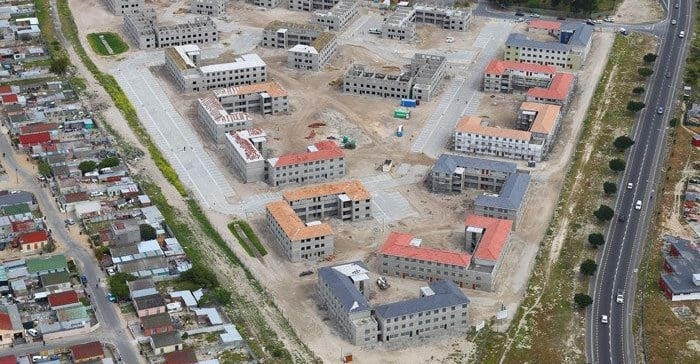Belhar Gardens receives EDGE preliminary grading from GBCSA
The Green Building Council of South Africa (GBCSA) has recognised the Belhar Gardens social housing development for its water and energy saving design.

Situated on the corner of Carmen End and Symphony Way, the development was completed in August this year. The development comprises 630 social housing units managed by the Madulammoho Housing Association, one of the social housing companies which has partnered with the City of Cape Town.
Limit impact on environment
"Belhar Gardens recently achieved an EDGE preliminary grading from the GBCSA, meaning it has been recognised for Excellence in Design for Greater Efficiencies. The final certification is to be issued within the next two months. The significance of this certification cannot be overstated. Cape Town is facing one of the worst droughts in recorded history. The long-term sustainability of our city depends on our ability to plan ahead, use innovative technologies, and foster an acute awareness of how we use scarce resources. It is imperative that all of us who are involved in urban development, be it the private or public sector, focus on methods and innovative designs to save water and electricity, and to limit the impact on our environment.
"I want to commend Madulammoho for this achievement and for setting the benchmark in social housing developments. We are proud to have them as a social housing partner. They have proved to the industry that one can go green when building affordable housing units, and that energy and water efficiency is not the sole preserve of upper-income developments," said the City’s Mayoral Committee Member for Transport and Urban Development, Councillor Brett Herron.
The tenants, the majority of whom are from the Belhar area or work in close proximity to the development, have already moved in. Up to 30% of the units were reserved for households with a combined monthly income of less than R3,500 per month, and 70% were allocated to households earning a monthly income of between R3,500 and R7,500.
30% less water and energy
"Tenants residing in social housing developments must be able to pay rent, and are charged for their water and electricity usage. Thus, the energy and water saving design implemented at Belhar Gardens also benefits the tenants as the savings are passed on to the households, making these units more affordable," said Herron.
The units at the Belhar Gardens development use, on average, 30% less water and energy than other housing developments with traditional water and energy designs.
"Each unit has been fitted with water flow restrictors and water meters that measure the amount of hot and cold water used. In so doing, the household or tenant is aware of their water usage at all times, and can implement their own water saving methods. We have also replaced conventional geysers with heat pump stations at every block of units. The heat pumps can save up to 48% in electricity use, compared with conventional geysers. The hot water is measured separately for each unit, meaning we pass the savings on to the tenant," said Madulammoho’s CEO, Renier Erasmus.
The EDGE preliminary certification confirms that the design implemented at the Belhar Gardens development meets the minimum benchmark saving of 20% in water and energy used. The GBCSA conducted the final audit and site inspection a month ago and is expected to issue the full certificate by January 2018.
"The initial cost associated with the energy saving design is higher when compared with conventional designs. The heat pumps are, for example, two times more expensive than conventional geysers and came at an additional cost of approximately R5m for this development. The water reduction designs added an extra R1,000 for each unit. That aside, we think this is the way to go as we want to make our units as affordable as possible," said Erasmus.
Pursuing the green agenda
The city’s Transport and Urban Development Authority is pursuing the green agenda.
"The GBCSA certification is important as it demonstrates that affordable housing can go green and still be viable. We want developers to take note, and to follow the example set by Madulammoho. In the meantime, we are also looking into innovative designs that can save us water and electricity, as well as exploring alternative building materials that are cheaper and environmentally friendly," said Herron.
Agreements with social housing companies are based on the public-private partnership model for service delivery. These agreements stipulate the aims, goals, objectives, performance targets, and specific areas of cooperation between the city and the institutions. The city provides rates subsidies and the social housing companies access capital subsidies from other spheres of government to ensure that more affordable rental accommodation options are provided.
"When council adopted the Organisational Development and Transformation Plan in August 2016, we made a commitment to take radical steps to accelerate change. The Transport and Urban Development Authority is tackling the housing challenge head-on, and we are proud to have partners from the private sector who assist us in providing decent and affordable housing to those who need it most," said Herron.